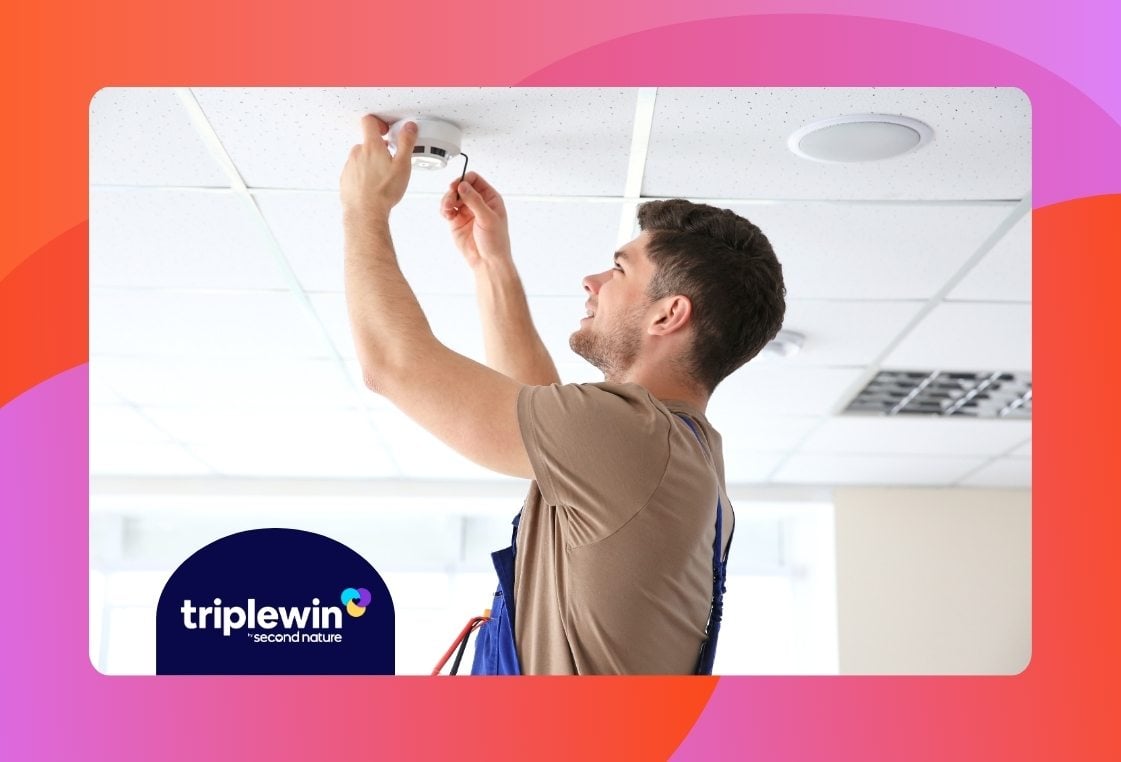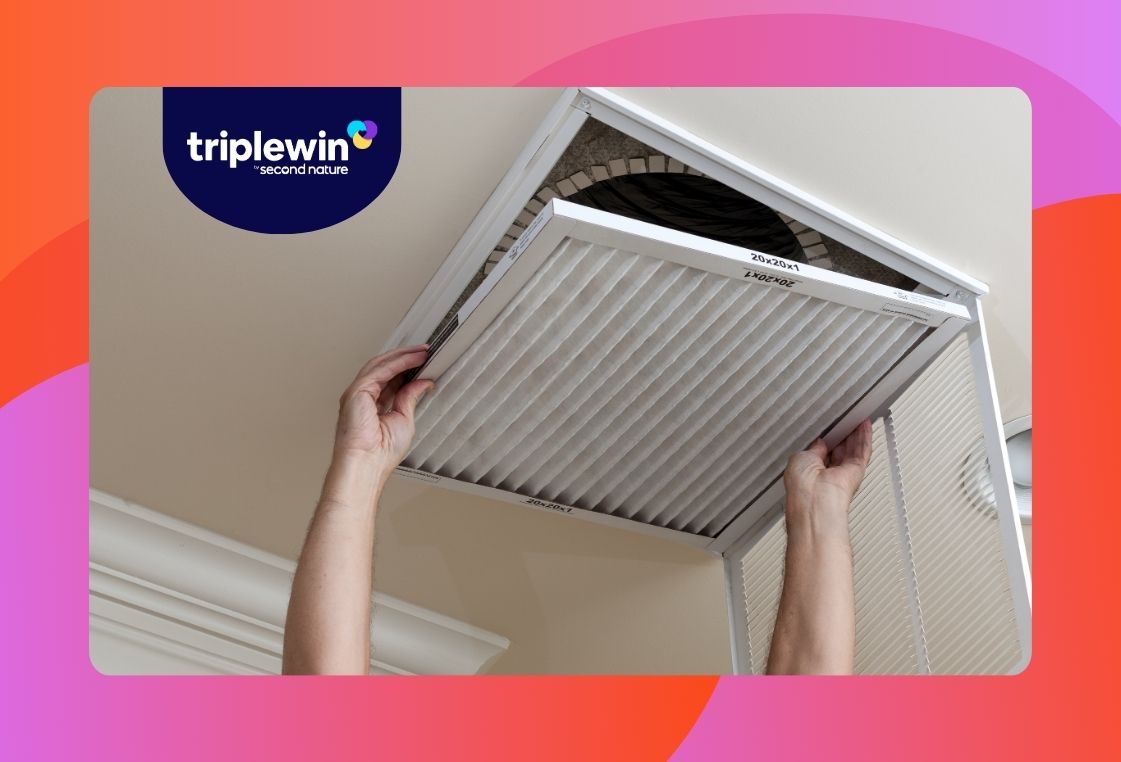Property Management Rental Inspection Checklist [Free Template]
There's a hero tool that stands between you and potential disputes, wear and tear issues, and even costly oversights. It's a Property Management Rental Inspection Checklist. Now, someone who isn't in property management might think, "It's just a checklist, right?" But professional property managers know that without it, everything can kind of fall apart. Throughout this article, we'll dive deep into what rental inspections are, their undeniable importance, the key items you shouldn't overlook, and – because we love making your life easier – we're gifting you a comprehensive checklist template. Stick around to have all your pressing questions answered in our FAQ section and discover how Second Nature can be your partner in acing rental inspections. What is a Rental Inspection? A rental inspection is a systematic evaluation of a rental property's condition carried out by the property manager, landlord, or a dedicated inspector. It’s not just a casual walkthrough of the premises. The inspector will thoroughly assess every nook and cranny of the property – from the foundation to the roof, from the plumbing to the electrical fittings – is thoroughly assessed. The primary goal? To ensure that the property meets all safety and maintenance standards, that the residents are complying with their lease agreements, and that potential issues are identified and addressed before they escalate into major, costly problems. Think of it as a health check-up, but for properties. It provides an objective snapshot of the property's current state and offers insights into areas that might need attention or repair. Here's an example of what a checklist might look like: Why Are Rental Inspections Important? Rental inspections play a crucial role in the property management world, and here’s why: Resident Experience: A well-maintained property is a happy home for residents. When renters see that the property management company is proactive about upkeep, it fosters a sense of value and respect. This can translate to longer tenancies, on-time rent payments, and even positive word-of-mouth referrals. (Learn more about this in our State of Resident Experience Report.) Protection of Assets: Your rental property is a significant investment on the part of your client. Regular inspections ensure it remains in top condition, preventing minor issues from escalating into costly repairs, and protecting your clients’ real estate investments. Safety Assurance: By checking everything from electrical fittings to potential structural issues, inspections make certain the property is safe for habitation. No landlord wants to be on the receiving end of lawsuits or liabilities. Lease Compliance: Regular inspections ensure that tenants are adhering to the terms of their lease, such as not making unauthorized alterations or keeping pets when they aren’t allowed. Predictive Maintenance: Rather than always being in a reactive mode, inspections help in predicting potential issues. This way, you can schedule maintenance tasks before problems arise, which can be more cost-effective in the long run. Property Value Preservation: A well-inspected and maintained property not only attracts and retains quality tenants but can also help maintain or even increase its market value over time. In essence, rental inspections aren’t just a formality; they're a pivotal tool in ensuring the long-term success of your property management endeavors and in enhancing the overall resident experience. What to Include in a Rental Inspection Checklist When you're planning a rental inspection, your approach should be methodical and thorough. As Janet Sprissler, Broker/Owner at Rent 805, puts it: “There are no optional parts of the checklist. That’s why it’s a checklist; you have to check everything off. I don’t have any nice-to-haves on my checklist because everyone is treated the same. We don’t do for one resident what we won’t do for the other.” Organizing your checklist by room or space is a practical way to ensure no corner is overlooked. For each item listed within these spaces, always include a status, such as "Good," "Requires Maintenance," or "Replaced." This helps in keeping track of the condition and any changes over time. You should also consider what type of inspection you’re conducting and may want to tweak what you include depending on where the property is in its rental cycle. Different types of inspections include: Move-In Rental Inspection: Conducted right before a resident moves in, the move-in inspection serves as a benchmark for the property's condition at the start of a lease. It helps to document the existing state of the property, from the functionality of appliances to the appearance of the interior and exterior. This documentation can be invaluable in resolving potential disputes over damages when the resident eventually moves out. Move-Out Rental Inspection: Carried out once the resident vacates, this inspection compares the property’s condition to its state during the move-in inspection. It identifies any damages or changes that have occurred during the tenancy. Based on this, you can decide what portion of the security deposit needs to be returned. Routine Rental Inspections: These are regular checks conducted during a resident’s lease period. Typically done every six to twelve months, routine inspections monitor the ongoing condition of the property. They're also a great way to catch and address issues early, as well as to ensure lease compliance. “Drive-By” Rental Inspections: These are less invasive checks where property managers drive by the property to ensure its exterior is in good shape and being maintained appropriately. This type of inspection is less about detailed checks and more about getting a general sense of the property's outward appearance and ensuring no major lease violations are visible. For single-family property managers, these inspects may be less frequent since properties are often spread out from each other geographically. As you create your rental inspection report, remember that every property is unique. While categorizing by room ensures thoroughness, it's essential to adjust and add specific items tailored to each property’s unique features and needs. And always remember, communication is key. Ensure that residents are aware of inspections, their purpose, and the schedule to foster a transparent relationship. How to Conduct Rental Inspections Given the importance of rental maintenance, it's important to conduct inspections methodically and thoroughly. We highly recommend using a detailed checklist to ensure you are covering all areas of the property. It's also critical to conduct inspections in a professional and courteous manner to maintain a positive relationship with residents. This means informing them about upcoming inspections (notice may also be required by local laws – more on that below), scheduling inspections at reasonable times, and generally minimizing disruptions to their daily routine. As indicated above, there’s also an important compliance component to rental inspections, so be sure to familiarize yourself with local housing regulations to ensure your inspections meet all legal requirements. This will help you abide by fair housing laws and avoid discriminatory practices. To protect everyone involved in the process, document inspections thoroughly and maintain accurate records. You’ll find it helpful to schedule inspections regularly, for example, on a semi-annual basis, in order to nip any maintenance issues in the bud. Semi-annual inspections should focus on the property's overall condition, including the exterior, interior, and appliances. You’ll also check for wear and tear, potential damage, and any maintenance needs. Also, ensure that safety systems, such as smoke detectors and carbon monoxide detectors, are functioning properly. Yearly inspections are an opportunity for more in-depth inspections, including a detailed examination of the roof, foundation, and HVAC system. You'll assess these for any signs of structural damage or pest infestations, and update any necessary documentation, such as property records and insurance policies. As for the inspection process itself, simply follow the following 6 steps: Schedule the inspection: Coordinate with the resident to schedule a convenient time for the inspection. Gather your materials: Prepare your inspection checklist, camera, and any necessary tools. Conduct the inspection: Work through your checklist, taking note of any issues or concerns throughout the process. Document findings: Take photos and videos of any visible damage or maintenance needs. Communicate with the resident: Discuss your findings with the resident and address their questions or concerns, if any. Follow up: Create a plan to address any issues identified during the inspection. By following these guidelines, your rental inspections go a long way toward protecting the investment, maintaining property value, and ensuring resident satisfaction. How to Notify Tenants about Rental Inspections As mentioned above, effective communication is vital during the inspection process. Here are some tips to ensure that your approach is as thorough as possible. Provide written notice While the property manager's right to inspect the property may be (and should be) specified in the lease agreement, including frequency and required notice, you should also send a formal written notice to the resident, either by mail or email. This notice should include the date and time of the inspection, as well as the purpose (such as routine maintenance, addressing maintenance requests, or ensuring compliance with lease terms). You should also indicate whether the tenant's presence is required during the inspection, and provide your contact information in case of questions or concerns. Choose the right time Be sure to schedule inspections during reasonable hours. For example, avoid early mornings, late nights, or times when the resident may be unavailable. If possible, work with the residents to find a time that’s convenient for them. Respect resident privacy Before entering the property, knock on the door and announce your presence. Limit disruptions by keeping the inspection brief and by avoiding unnecessary distractions. If you need to access areas with personal belongings, handle them with care. Document the inspection Document the condition of the property, any maintenance issues, and any violations of the lease agreement. Consider sharing a copy of the inspection report with the tenant, especially if there are any issues that need to be addressed. Address resident concerns If the resident has any concerns or questions about the inspection, address them promptly and courteously. Explain the reasons for the inspection and the importance of maintaining the property. These tips will help you maintain a positive relationship with your tenants while also protecting the property investment. Property Management Rental Inspection Checklist With the help of OnSightPROS, we've developed a rental inspection checklist template for single-family rental property management companies. Use this template to build out your checklist. General Overview Date of Inspection: Inspector Name: Tenant Name: Address: Previous Inspection Date: Front Exterior Status: [Good / Needs Maintenance / Poor] Mailbox: Functional door and flag, no damage Lawn and garden: Well-maintained landscaping free of debris, no bald grass spots Driveway and walkways: No cracks or obstacles Fencing: In good condition, no damage Exterior lighting: All bulbs functioning Windows/Screens: Clean, no cracks, seals intact, screens intact Walls/Siding: No damage or cracked/peeling paint or caulking, no insect damage Downspout/Splash Blocks: Attached properly Light Fixtures: No missing bulbs or broken fixtures Roof/Trim/Gutter: No visible damage or leaks, discoloration, holes, clogged or loose gutters Rear Exterior Status: [Good / Needs Maintenance / Poor] Lawn and garden: Well-maintained, free of debris, no bald grass spots Patio/Walkways: No cracks or obstacles BBQ Grill: Set away from house, not under awnings Rear Door: Weather stripping intact, locks installed as needed Possible Hazards: Trampoline, open fire pit, swing set Pool: Clean, clear water, no damage, fence and lock in place Fencing: In good condition, no damage Exterior lighting: All bulbs functioning Windows/Screens: Clean, no cracks, seals intact, screens intact Walls/Siding: No damage or cracked/peeling paint or caulking, no insect damage Downspout/Splash Blocks: Attached properly Light Fixtures: No missing bulbs or broken fixtures Roof/Trim/Gutter: No visible damage or leaks, discoloration, holes, clogged or loose gutters Entry Status: [Good / Needs Maintenance / Poor] Smell test: No odors from animals, smoke, waste, must Patio/Porch: No cracks in concrete, railing, stair intact Front door exterior: No scratches, chipping, stains Locks/Keyless Deadbolts: Check for installation, functioning correctly Front door interior: No gaps in weather stripping, clean Walls and ceiling: Clean, no signs of mold or damage Closets: Shelves stable, no stains or damage to walls Flooring: No damage, carpets clean Blinds/Drapes: Fully functional and clean Windows: Open and close easily, locks work Living Room Status: [Good / Needs Maintenance / Poor] Smell test: No odors from animals, smoke, waste, must Door/Door stops: Fully functional Walls and ceiling: Clean, no signs of mold or damage Ceiling fans: Working properly Closets: Shelves stable, no stains or damage to walls Flooring: No damage, carpets clean Blinds/Drapes: Fully functional and clean Windows: Open and close easily, locks work Kitchen Status: [Good / Needs Maintenance / Poor] Smell test: No odors from animals, smoke, waste, must Door/Door stops: Fully functional Flooring: No damage, carpets clean Walls and ceiling: Clean, no signs of mold or damage Cabinet under sink: No leaks with running water, no standing water Countertops/Backsplash: Clean, no damage, caulking intact Cabinets: Doors/drawers work, no damage Sink/Faucet: No leaks, drains well, spray hose works Pantry: Shelves intact, walls clean, lights functioning Appliances (oven, fridge, dishwasher, microwave, etc.): Clean, functional Exhaust fan: Functional, no excessive noise Windows: Open and close easily, locks work Hallway/Stairway Status: [Good / Needs Maintenance / Poor] Smell test: No odors from animals, smoke, waste, must Door/Door stops: Fully functional Handrails: No loose or missing spindles, or other damage Walls and ceiling: Clean, no signs of mold or damage Closets: Shelves stable, no stains or damage to walls Flooring: No damage, carpets clean Blinds/Drapes: Fully functional and clean Windows: Open and close easily, locks work Bedrooms (repeat for each bedroom) Status: [Good / Needs Maintenance / Poor] Smell test: No odors from animals, smoke, waste, must Walls and ceiling: Clean, no damage or mold Ceiling fans: Working properly Flooring: No damage, carpets clean Closets: Shelves stable, no stains or damage to walls Door/Door stops: Fully functional Blinds/Drapes: Fully functional and clean Windows: Open and close easily, locks work Bathrooms (repeat for each bathroom) Status: [Good / Needs Maintenance / Poor] Smell test: No odors from animals, smoke, waste, must Door/Door stops: Fully functional Flooring: No damage, no sagging floorboards or discoloration Walls and ceiling: Clean, no damage or mold Exhaust fan: Working properly Closets: Shelves stable, no stains or damage to walls Toilet: Flushes correctly, no leaks Sink/Faucet: Drains well, no leaks Cabinet under sink: No leaks with running water, no standing water Shower/bathtub: Drains well, faucets work, no mold Towel bars: Present and functional Mirrors: Clean, no damage Blinds/Drapes: Fully functional and clean Windows: Open and close easily, locks work Utility Spaces (if applicable) Status: [Good / Needs Maintenance / Poor] Smell test: No odors from animals, smoke, waste, must Door/Door stops: Fully functional Flooring: No oil stains or cracks Walls and ceiling: Clean, no damage or mold Closets: Shelves stable, no stains or damage to walls Blinds/Drapes: Fully functional and clean Cabinet under sink: No leaks with running water, no standing water Windows: Open and close easily, locks work Washer/dryer: Functional, no leaks. No lint or debris in dryer. Water heater: No visible damage, no leaks HVAC system: Operational, air conditioning filters clean, no moisture issues around drip pan Satellite dish: Attached to house correctly Garage (if applicable) Status: [Good / Needs Maintenance / Poor] Smell test: No odors from animals, smoke, waste, must Interior door/Door stops: Fully functional Garage door opener: Functions correctly Flooring: No oil stains or cracks Walls and ceiling: Clean, no damage or mold Windows: No damage, hardware intact, no evidence of moisture Storage areas: Organized, no damage Safety and compliance Status: [Good / Needs Maintenance / Poor] Handrails: In good condition, no damage Smoke alarms: Up to code, batteries good, working order. Fire extinguishers: Inspected, and placed in easily accessible and visible spots. Carbon monoxide detectors: Up to code, batteries good, working order Electrical outlets: Functioning, GFCI compliant installed Lighting fixtures: Functional, no missing bulbs or broken fixtures Lighting: Functional Electrical panel: Good condition, labeled, all circuit breaker boxes work properly Additional Notes: Space for the inspector to make any additional comments or observations. Signature: Inspector’s signature, date. What To Do After a Rental Inspection Once you've conducted your inspection, there are a few steps you can take to make sure you're not missing any identified issues. 1. Document the inspection: Create a detailed written report of the inspection, including the date and time of the inspection, the property address, and the names of the inspector as well as the resident. Include all observations about the property's condition, particularly any damage, wear and tear, or maintenance issues. You'll want to take photos or videos of any significant issues, and keep a record of the inspection report in your property management records. 2. Communicate with the resident If appropriate, share the inspection report with the property resident, highlighting any concerns or maintenance issues. Address questions and concerns promptly and courteously. If maintenance or repairs are needed, provide the resident with the expected timeline for completion. 3. Schedule repairs Prioritize maintenance tasks based on their urgency and impact on the property's condition and resident safety. Where needed, hire reliable contractors to complete the repairs. As needed, monitor repair progress and ensure that they’re completed on time and to your standards. 4. Follow up Once the repairs are completed, inform the resident and schedule a follow-up inspection as necessary. If the resident has concerns or complaints about the repairs, address them promptly. 5. Update your records Update your property management records to reflect the completed repairs and any other relevant information. FAQs Here are a few frequently asked questions about rental inspections. Q: How often should you conduct rental inspections? A: The frequency of rental inspections can vary based on several factors, including local regulations, lease agreements, and the specific needs of the property. Generally, here's a recommended guideline: Move-In Inspection: Once, right before a new resident moves in. Move-Out Inspection: Once, immediately after the resident vacates. Routine Rental Inspections: Typically, every six to twelve months. It's a balance between ensuring the property is being maintained without being overly intrusive to your residents. Drive-By Rental Inspections: These can be conducted more frequently, perhaps quarterly, since they are less invasive and don’t require entering the property. However, always consult your local laws and regulations, as some areas might have stipulations on how often you can inspect a rented property. Also, it's crucial to provide residents with proper notice before any inspection, respecting their privacy and rights. Q: Can a tenant refuse a rental property inspection? A: While rental inspections are essential for property managers, tenants have rights, and their privacy must be respected. Generally, a resident cannot outright refuse a rental property inspection if: It's Stipulated in the Lease: Most rental agreements or leases have clauses that allow for periodic inspections by the property manager or landlord, given proper notice. Adequate Notice is Given: Many jurisdictions require landlords to provide a specific amount of notice (usually 24-48 hours) before entering the property unless there's an emergency. The Inspection is Conducted at a Reasonable Time: Inspections should be scheduled during reasonable hours, avoiding early mornings, late nights, or any time that might intrude on the tenant's reasonable expectation of quiet enjoyment. However, if a resident has a valid reason like health concerns, religious reasons, or personal issues, it might be possible to reschedule the inspection to a more convenient time. Always be sure to check local laws and regulations as tenant rights can vary by jurisdiction. Open communication and understanding between both parties can help mitigate any concerns or conflicts. Make Property Management Easier with Second Nature At Second Nature, our goal is to make property management easier for professional property managers. We built our Resident Benefits Package to support property management companies in delivering the best resident experience on the market. From a move-in concierge to air filter subscriptions to rent reporting, we deliver the services that residents will pay for – and stay for. Learn more about our RBP today!
 October 10, 2024
October 10, 2024
Read more

March 19, 2025





